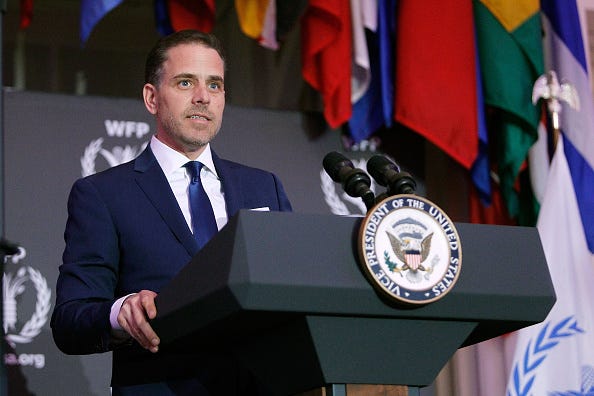Judicial Notice (06.24.23): Hunter And Fishing
United States v. Hunter Biden, Justice Alito v. ProPublica, Biglaw v. incoming associates, and other legal news from the week that was.

Welcome to Original Jurisdiction, the latest legal publication by me, David Lat. You can learn more about Original Jurisdiction by reading its About page, and you can email me at davidlat@substack.com. This is a reader-supported publication; you can subscribe by clicking on the button below. Thanks!
Happy birthday to… me. My birthday fell on Monday. And I’m honored to share it with the deeply meaningful holiday of Juneteenth, an annual commemoration of the end of slavery in the United States after the Civil War.
I had a good week. First, I showed up in a few news stories, playing a bit part in the latest controversy surrounding Justice Samuel Alito. Second, my co-host Zach Sandberg and I recorded a new episode of Movers, Shakers & Rainmakers, featuring legal-marketing expert Stefanie Marrone. Third, I exercised and ran (reasonable) caloric deficits every day; I’ve lost eight pounds in the past four weeks, but I’d like to lose eight more. I welcome diet and exercise advice in the comments.
Now, on to the news.
Lawyer of the Week: Christopher Clark.
The biggest legal story of the week was the U.S. Department of Justice (DOJ) entering into a plea agreement with Hunter Biden, the wayward son of President Joe Biden. (Hunter is, by the way, a graduate of Yale Law School—so between him and Oath Keepers founder Stewart Rhodes, YLS grads are having a great year so far.)
As set forth in a terse statement by David C. Weiss—the Trump-appointed U.S. Attorney for Delaware who was allowed to stay in his job despite the change in administration, in order to handle the Hunter Biden case—Hunter agreed to plead guilty to two misdemeanor tax offenses, stemming from his failure to pay his 2017 and 2018 taxes on time. In addition, he agreed to enter into a pretrial diversion agreement on one felony firearm offense, possession of a firearm by an unlawful user of and addict to a controlled substance. This means that the DOJ won’t prosecute him on the gun offense (and he won’t go to prison), provided that he remains drug-free for 24 months and agrees never to own a firearm again.
As you’d expect in such a high-profile case with political overtones, both sides quickly retreated to their corners. Republicans declared the deal a miscarriage of justice, while Democrats argued that punishing Hunter more harshly would have been the travesty. To get a more impartial assessment, I was going to reach out to lawyers with experience handling criminal tax cases—but Politico beat me to it. Alas, it was a split decision, with two former IRS lawyers saying the deal was standard and two other former tax officials claiming it was unusually lax.
Lacking the expertise to opine on the harshness or leniency of the agreement (I didn’t handle tax cases during my time as a federal prosecutor), I’ll instead explore what it means for the attorneys. I agree with Norm Eisen, who opined in CNN that it’s a win for Hunter and his lawyers, since “a plea deal minimizes Biden’s risk of incarceration and lets him close this dark chapter of his life.” So congratulations to Hunter’s lead criminal-defense attorney, Chris Clark, who secured a great outcome for his client. (As noted by Eisen, prominent trial lawyer Abbe Lowell of Winston & Strawn also represents Hunter, but Clark took the lead on the plea negotiations.)
In April, I interviewed Clark for my podcast, right after he left Latham & Watkins to launch his own boutique, Clark Smith Villazor. He couldn’t say much about the Hunter Biden case at the time, but he did declare himself “really proud to be representing Hunter,” who “has maintained his sobriety for years now,” and pledged that his team would be “involved until we win it for him.” And even though Hunter did have to enter guilty pleas, I consider this disposition a win: the offenses are mere misdemeanors, he’s avoiding prison, and he’s sparing his father (further) embarrassment and political pain.
Other lawyers in the news:
Steven Schwartz and Peter LoDuca, aka the “ChatGPT lawyers,” got sanctioned by Judge Kevin Castel (S.D.N.Y.) for filing a brief relying on non-existing cases. They must pay a $5,000 fine—and send a copy of Judge Castel’s sanctions opinion to the real-life judges identified as authoring the fake cases (cringe).
Kyle Roche, the legal world’s version of San Bankman-Fried—digital Boy Wonder turned Hester Prynne, with a big scarlet “C” for “crypto” across his chest—was profiled in the New York Times.
Disbarment proceedings for John Eastman, aka the legal architect of January 6, are now underway in California.
Gervonta “Tank” Davis, the champion boxer who is his own worst enemy when it comes to legal proceedings, has finally done something smart: he has hired Alex Spiro as his (latest) defense attorney.
Judge of the Week: Justice Samuel Alito.
Oops, he did it again: Justice Samuel A. Alito Jr. made himself the center of a national controversy. And he found a cheeky, in-your-face way of doing it, living up to the nickname I previously bestowed upon him, “The Real Justice of New Jersey”—because here in the Garden State, we’re all about the table flipping.
The pugnacious Jersey jurist (and Yale Law alum) has previously sparred with everyone from then-President Obama (“not true, not true”), critics of the Supreme Court’s “shadow docket,” and even the Duke of Sussex aka Prince Harry. Who was Justice Alito’s target this time?
Keep reading with a 7-day free trial
Subscribe to Original Jurisdiction to keep reading this post and get 7 days of free access to the full post archives.



